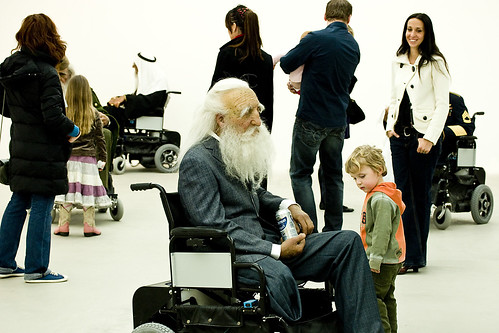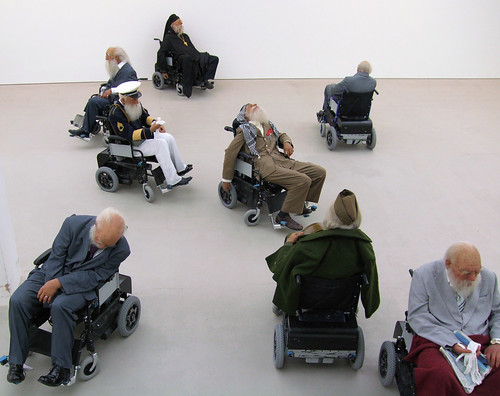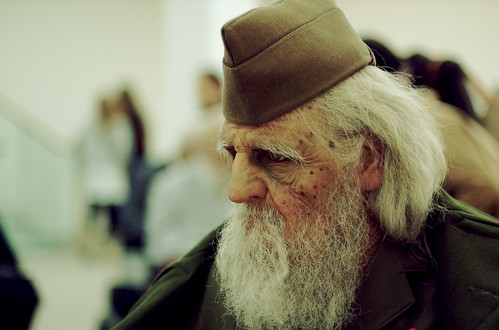 One of the challenges about seeing every country in the world is that we don't live long enough to cover all that ground. It sure would be easier if we lived to 120 year old. But would you want to?
One of the challenges about seeing every country in the world is that we don't live long enough to cover all that ground. It sure would be easier if we lived to 120 year old. But would you want to?
Most Americans would rather not take medical treatments that would allow them to live to 120, according to poll data that Pew Research just released. Specifically, 56% said that they would not take such treatments, while only 38% said they would.
Meanwhile, the majority of Americans think that they're in the minority, because while they said that they personally wouldn't want such life extending treatments, 68% thought that "most people" would take them and only 27% would not. In other words, most Americans thought that most people would not behave like they do.
Nearly 7 in 10 Americans would like to live between 79 and 100 years old. Their median ideal life span is 90 years, which is about 11 years longer than today's average U.S. life expectancy (78.7 years).
 Some may this finding counter-intuitive: nearly twice as many people would rather die before 79 years old than live to be over 100 (14% vs. 8%, respectively).
Some may this finding counter-intuitive: nearly twice as many people would rather die before 79 years old than live to be over 100 (14% vs. 8%, respectively).
Although only of a quarter of Americans think that by 2050 the average person will live to 120 years old, they are optimistic about future medical advances. For example, 7 out of 10 believe that we'll cure most forms of cancer by 2050 and that artificial legs and arms will perform better than natural ones. Twice as many Americans think "medical advances" are "generally good" rather than "interfere with the natural cycle of life" (63% vs. 32%, respectively).
Still, let's suppose that three-quarters of Americans are wrong and that people really will be able to live to 120 years old with a bit of medical help. Now let's analyze the findings.
 Americans are saying that they want to live longer than the average American, but they don't want to become centenarians. They want to live 11 years longer than today's average American, but they claim that their competitive spirit will disappear once others start taking live extending measures that help them live beyond 120 years old. Will Americans in 2060 really be content to die at 90 years old―30 years before their fellow citizen? That's hard to imagine given that most people today would rather live longer than the average. It seems that this survey illustrates how we are not good at predicting how we will behave.
Americans are saying that they want to live longer than the average American, but they don't want to become centenarians. They want to live 11 years longer than today's average American, but they claim that their competitive spirit will disappear once others start taking live extending measures that help them live beyond 120 years old. Will Americans in 2060 really be content to die at 90 years old―30 years before their fellow citizen? That's hard to imagine given that most people today would rather live longer than the average. It seems that this survey illustrates how we are not good at predicting how we will behave.
Or perhaps not. After all, 58% of Americans say that treatments that would allow us to live beyond 120 years old "would be fundamentally unnatural" (37% disagree). However, one must wonder what Americans think when a doctor puts a coronary stent in a heart attack patient. Is that "fundamentally natural?"
I just left Guinea Bissau, which has the world's third lowest life expectancy (50 years). Over 100 years ago, most people on the planet never even got to 50. Nowadays, to live to 90 years (or even to 50), most of us need a variety of life extension treatments which might include: vitamins, prescriptions medicines, surgery, chemotherapy, herbal medicine, artificial organs, kidney dialysis, and/or acupuncture. One could argue that all these treatments are "fundamentally unnatural," since our immune system doesn't produce them. Indeed, if people from 500 years ago saw what senior citizens do to stay alive today, they would certainly be shocked and decry that our everyday treatments are "fundamentally unnatural."
 Whereas 56% of Americans claim they would not take medical treatments that would let them life to 120, those same Americans eagerly take current treatments that allow them to live beyond 50.
Whereas 56% of Americans claim they would not take medical treatments that would let them life to 120, those same Americans eagerly take current treatments that allow them to live beyond 50.
The survey didn't address the probable assumption that many people made: that life at 120 must be rough. But life at 85 is pretty challenging for most 85-year-olds, yet that doesn't stop us from wanting to live to 90. It would have been interesting if the survey had asked, "If you could live to 120 and feel like today's 70-year-old, would you take the treatments?" I suspect far more would.
Pope Benedict wrote, "What would it really be like if we were to succeed, perhaps not in excluding death totally, but in postponing it indefinitely, in reaching an age of several hundred years? Would that be a good thing? Humanity would become extraordinarily old, there would be no more room for youth. Capacity for innovation would die, and endless life would be no paradise, if anything a condemnation."

Most Americans (51%) agree with the Pope on this issue and say that allowing people to live to 120 years old would be a "bad thing" for society (41% say it would be a "good thing.") Whether it's good or bad, what is clear is that medical advances will continue, life expectancies will continue to rise, and our desire to live beyond the average will almost certainly continue too.
In conclusion, the point is that the Pew Research survey (which interviewed 2,000 Americans) illustrates how we are sometimes poor at predicting our own behavior. Certainly, most want to live a long healthy life. Still, what we define as "long" has shifted dramatically in the last 200 years. Today, it's 90 years. Someday, it will be 120 years. That means that someday, when a man dies at 90 years old, we'll say, "Oh, what a pity that he died so young."
SOURCE: Pew Research, "Living to 120 and Beyond, August 6, 2013"
Response by Robert Young of the Gerontology Research Group
Robert Young is an expert on aging and he wrote me an intelligent rebuttal to my article. To illustrate another perspective, here's what Robert Young says:
I would like to comment that these types of articles are "fundamentally" misleading.
First off, there seems to be a confusion between life expectancy and life span. While modern treatments have greatly increased life expectancy, there has been little change in life span over millennia. Since the advent of agriculture, when societies advanced to the point to be able to care for elder members in settled communities, humans have occasionally reached age 100 or more. The fundamental rate of aging for homo sapiens has not changed, only our ability to respond to it.
It's also true that many of the advances made over the past 200 years have fixed "low-hanging fruit" problems, such as premature deaths due to contagious diseases and environmental workplace hazards. None of these advances...not even heart stents...deal with the fundamental rate of aging. It's like repairing an old car...except that old cars don't need to run 24 hours/day, 7 days a week, 365 days a year, like the human body does.
It's also true that, in the 37 years until the year 2050, attitudes toward aging and longevity will self-adjust. Ideas such as "50 is the new 40" show that societal attitudes toward aging have begun to shift, in response to the average age of society increasing, as well as to better benefits over the cumulative life course. Someone born in 1900 in the USA in most places lacked adequate dental and medical care, medicine, food, water, transportation, et cetera. Someone born in 1950 likely started out with some benefits already in place, and thus at age 60 in 2010 would be in better shape than someone born in 1900 and aged 60 in 1960. But this still doesn't address the fundamental rate of aging. Indeed, scientific experiments have not yet produced a mus musculus (lab mouse) that has cracked the five-year-old barrier (the oldest on record just missed at 4.98 years). This, despite the existence of a Methuselah Mouse prize.
The real question for me is why do 25% of the public believe that the average human will live to "120" in the year 2050? It's a lot easier to project fanciful ideas into the future than it is to take in an honest assessment of the longevity trends. Let's take a look at the facts: as of 2013, only ONE person in history has been scientifically documented to have reached age 120 or greater. That was Jeanne Calment of France, who died in 1997 at age 122 years, 164 days. Since the death of Sarah Knauss, 119, of the USA on Dec 30 1999, not one validated person has reached even 117 years old, in 13 years. Also, premature predictions of living long being just around the corner are now being taken back. In 1990, the US Census Bureau estimated that, by the year 2010, 131,000 Americans would be 100 years old or older. The actual count, 20 years late? 53,364, less than half of the prediction. Something's wrong here. I think we need to worry about why the data increase has slowed in the last decade, not about too much potential exceeding social acceptance.
 If anything, the public first needs the media attitude toward aging to shift. Many programs on television favor youthful news anchors, movie stars, et cetera. For women especially, older women are often passed over for these types of roles in favor of the more-youthful look. Barbara Walters is the exception to the rule.
If anything, the public first needs the media attitude toward aging to shift. Many programs on television favor youthful news anchors, movie stars, et cetera. For women especially, older women are often passed over for these types of roles in favor of the more-youthful look. Barbara Walters is the exception to the rule.
The bottom line: I wouldn't worry about life-extension success exceeding social acceptance. I'm more concerned with overly-optimistic media coverage getting people's hopes up.
There was a 1909 New York Times article that asked leading experts of the day to predict how long humans would live a century later. The optimistic prediction, by Dr. Metchnikov, was "140". The more realistic prediction, by actuarian Thomas Emley Young, was "125". The result, in the year 2009? 122. Both exceeded reality, although the man who studied the data from a mathematical perspective was far closer to being right than the one touting experimental treatments.
Sincerely,
Robert Young, Gerontology Research Group
My response
I appreciate Robert Young's excellent points (especially about human lifespan) and he certainly made me re-evaluate my beliefs.
Still, I maintain that we'll eventually extend human lifespan. However, it may take us hundreds years to figure it out. The key will be downloading brain somehow and/or using stem-cell-like biology to replace the aging brain's dying cells.
The other parts of the human body will be far easier to replace with mechanical means (e.g., an artificial heart and dialysis machines). That will happen this century.
Finally, while we may not be able to improve human lifespan for many decades or even centuries, life expectancy will continue going up for years to come (unless a major catastrophe happens).



